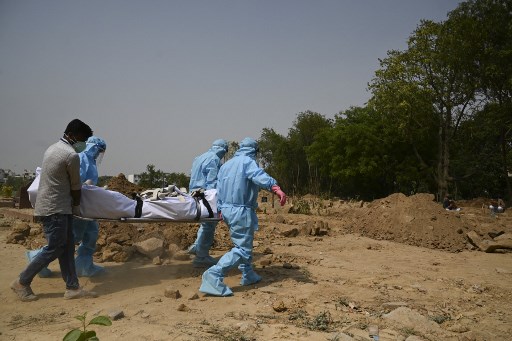
Photo: Relatives and friends put on personal protective equipment (PPE) suits before the burial of their loved one who died from the Covid-19 coronavirus, at a graveyard in New Delhi on April 30,2021. /AFP
The dire situation of India’s Covid-19 aroused worldwide attention for the week. As other countries are in full swing for the vaccine rollout to ease the pandemic, India is ravaged with the second wave of the Covid-19 and set a new global record of daily infections on Wednesday with 360,960 cases.
The headlines about India these days were replete with pictures of hospitals being short of oxygen and hospital beds and bodies being carried to cremation points.
A man even used an e-rickshaw to carry his mom’s body to be cremated when no ambulance was available. Johns Hopkins University data shows the number of infections in India is still escalating. While the cases in other countries are decreasing, these heartbreaking scenes in India tell the world that it is far from the victory over Covid-19.
Experts believe the political gatherings and religious festivals were responsible for this surge. Critics blame the incapacity of the government for this worsening situation. They never expect that India suddenly can need emergency shipments of oxygen and medical supplies from other countries. Indian people are scared and puzzled while being confronted with such a severe second wave of the pandemic.
The WHO staff has always been warning that mass gatherings, more contagious variants and low vaccination rates drive surge. Any country which does not respect social distancing, strict restriction policies of mass public activities and vaccinations will suffer. Despite these warnings and lessons from other countries, the Indian government’s lax policy to cope with the virus and the public’s weak consciousness of the effect of the virus inevitably result in the surge of the pandemic.
The Modi government has failed to handle the surge and has led the public to realize the significance of this. When other countries are still suffering from the pandemic and rack their brains on how to call for everybody to be vaccinated, Modi’s government claimed victory of Covid-19 three months ago. Such a declaration was like opening a Pandora’s box and sent a misleading message to the Indian public and leads them to ignore the fact that this is a contagious virus and can reemerge anytime as long as there are cases in other countries. When the public is misled, it is easy for them to forget there are still virus and choose to live without vigilance.
Starting May 1, all Indian adults over the age of 18 will be included in the vaccination program. However, experts believe the rollout of the vaccine is slow and the supply of the doses is short compared with developed countries like the US and UK, with over 142 million people and 33 million people aged 18 and over getting at least one dose of the vaccine. In comparison, only around 129 million people in India had be vaccinated with the first dose as of April 27, according to the Indian health ministry, which covers only 8% of India’s population. It’s like a trickle in the ocean to wait until most Indian people are vaccinated.
At this moment, oxygen and medical supplies from other countries are crucial for India. So is domestic vigilance and concerted efforts from India’s health care system, the government and the public. As potential variants continue to be found, India and the world need to cooperate to battle the pandemic. Vaccine stockpiling is not acceptable. Cooperation is the only way.
As WHO Director Tedros Ghebreyesus said, “No one is safe, unless everyone is safe”, no country can escape from the pandemic and every country needs to shoulder the responsibility. The world is more closely interconnected than ever before with the development of global business and vehicles. Only through a coordinated response can India and the world get through this pandemic.


